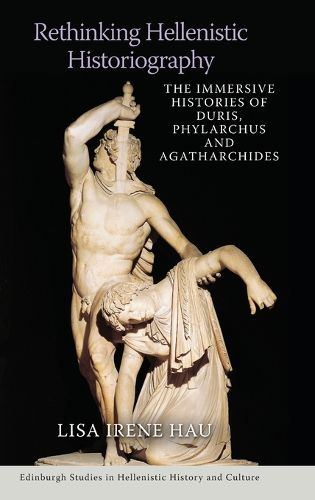Readings Newsletter
Become a Readings Member to make your shopping experience even easier.
Sign in or sign up for free!
You’re not far away from qualifying for FREE standard shipping within Australia
You’ve qualified for FREE standard shipping within Australia
The cart is loading…






This book offers a new examination of the so-called tragic historiographers Duris and Phylarchus, as well as the 2nd century BCE historiographer Agatharchides, using Polybius as a foil throughout. Lisa Irene Hau investigates the fragments and discusses the characteristics of each historical work in terms of themes, style and historiographical method. The analysis shows that these three historiographers deliberately wrote a different type of history from Ephorus and Theopompus, aiming to engage the reader sensually and emotionally in the historical narrative. Hau suggests 'immersive historiography' as a more fitting term than 'tragic history', and argues that the purpose of this experiential engagement of the readers was didactic: to teach them what it had been like to live through events of the past.
In the second half of the book, immersive historiography is placed in the context of ancient literary theory, Peripatetic philosophy and Hellenistic poetry and visual art. Applying the theory of immersion to ancient texts and placing these 'tragic' historians in their contemporary cultural context provides a new and innovative way of understanding of Hellenistic historiography.
$9.00 standard shipping within Australia
FREE standard shipping within Australia for orders over $100.00
Express & International shipping calculated at checkout
This book offers a new examination of the so-called tragic historiographers Duris and Phylarchus, as well as the 2nd century BCE historiographer Agatharchides, using Polybius as a foil throughout. Lisa Irene Hau investigates the fragments and discusses the characteristics of each historical work in terms of themes, style and historiographical method. The analysis shows that these three historiographers deliberately wrote a different type of history from Ephorus and Theopompus, aiming to engage the reader sensually and emotionally in the historical narrative. Hau suggests 'immersive historiography' as a more fitting term than 'tragic history', and argues that the purpose of this experiential engagement of the readers was didactic: to teach them what it had been like to live through events of the past.
In the second half of the book, immersive historiography is placed in the context of ancient literary theory, Peripatetic philosophy and Hellenistic poetry and visual art. Applying the theory of immersion to ancient texts and placing these 'tragic' historians in their contemporary cultural context provides a new and innovative way of understanding of Hellenistic historiography.